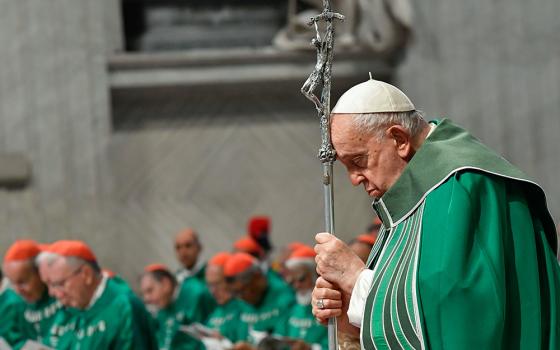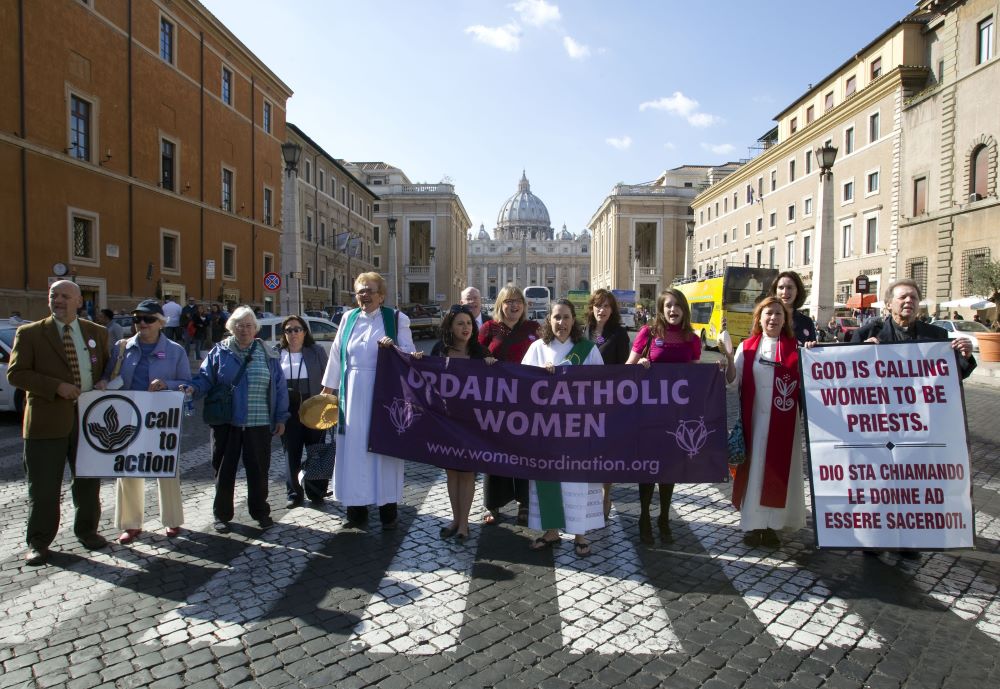
Members of the Women's Ordination Conference protest in front of St. Peter's Basilica, in Rome, on Oct. 17, 2011. The working document for the October synodal meetings includes this question for the synodal assembly to consider: "How can the Church of our time better fulfill its mission through greater recognition and promotion of the baptismal dignity of women?" (AP/Andrew Medichini, file)
Advocates for women's ordination — to the diaconate, the priesthood or both — say they are hopeful about the upcoming synod in Rome, despite some high-profile opposition to the possibility of expanded leadership opportunities for women in the church.
While they would like to see concrete proposals that increase women's participation, those who spoke to NCR said they are also excited about the process of synodality itself and believe the Oct. 4-29 series of meetings will surface fruitful conversation and dialogue.
"My hope is in the commitment of all of us to be a synodal people," said JoAnn Melina Lopez, director of faith formation at St. Basil Parish in Toronto, who will travel to Rome for a Sept. 30 ecumenical prayer vigil ahead of the synod. She will be part of a 17-member delegation of young adults affiliated with Discerning Deacons, a group that advocates for the restoration of women to the diaconate in the Catholic Church.
Documents summarizing two years of listening sessions in advance of the October series of meetings have included previously taboo topics, including women's ordination, LGBTQ relationships, married priests and clergy sex abuse. In addition, for the first time in history, lay men and women will be included as full voting members of the synod.
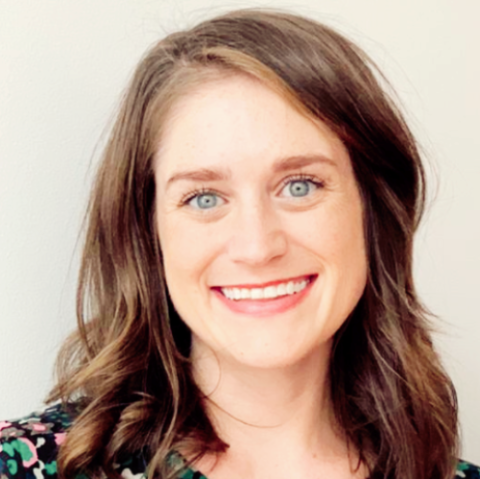
Kate McElwee, executive director of the Women's Ordination Conference is hopeful "that those in the room are courageous and open to the movement of the Holy Spirit" in expanding the role of women in the church, (Courtesy of Kate McElwee)
Kate McElwee, executive director of the Women's Ordination Conference (WOC), said it would be "premature" to predict an outcome from the meetings, but "we're hoping that those in the room are courageous and open to the movement of the Holy Spirit."
Both WOC and Discerning Deacons have participated in the synod process, hosting listening sessions and empowering women to participate in what McElwee calls an "unprecedented moment in the church."
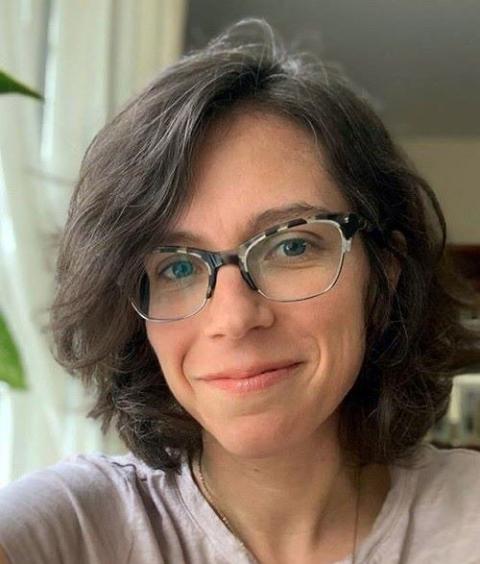
Casey Stanton, Discerning Deacons co-director, noted that women's participation in the church is not a fringe issue, saying, "The people of God called for this." (Courtesy of Casey Stanton)
Discerning Deacons co-directors Ellie Hidalgo and Casey Stanton told NCR they would like to see proposals about women's participation emerge from the October meetings, especially since the topic surfaced in listening sessions around the world.
"This is a key theme to deliberate if we're going to go on this synodal path," Stanton said. "The people of God called for this. It's not just a narrow interest group."
Miriam Duignan, a member of the leadership team for Women's Ordination Worldwide, or WOW, who lives in Great Britain, agreed. "It is a topic that can no longer be ignored," she said. "Bishops will know they cannot return home empty handed and must respond to their congregations who are demanding that the glaring injustice seen in every parish in the world must be addressed."
In Rome, representatives from women's advocacy groups plan to serve as a resource to synod participants and to monitor whether women participants' voices are being heard. WOC, WOW and other groups are hosting a "Walk with Women" on Oct. 6 in Rome to "encourage the church to walk alongside women as equals throughout the synod and beyond."
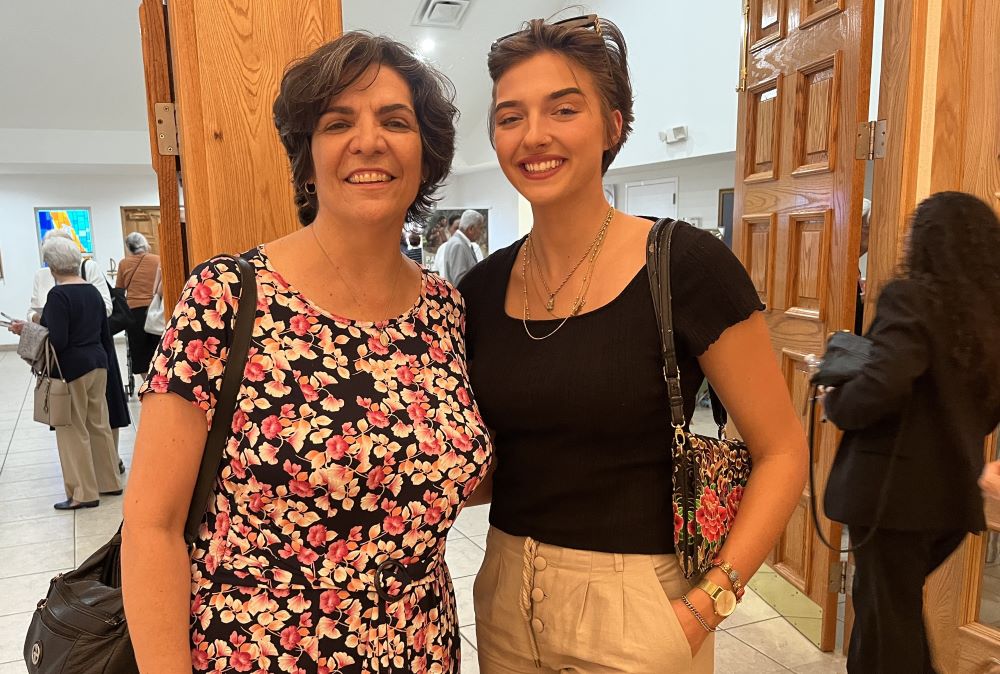
Discerning Deacons co-director Ellie Hidalgo (left) stands with niece Sofia Hidalgo. They will journey from Miami to Rome as part of the Discerning Deacons young adult delegation. (Discerning Deacons/Toni Miranda)
But not everyone in the church is enthusiastic about expanding women's roles in the church through the synod process. Bishop Joseph Strickland of Tyler, Texas released a pastoral letter Sept. 5, aimed at preempting synodal conversations about women's ordination to the priesthood or diaconate.
Noting that the ordination of women will “reportedly be a topic of discussion at the upcoming Synod on Synodality,” Strickland wrote that "Sacred Tradition and the Ordinary Magisterium of the Church have affirmed throughout the ages that the Church has no authority whatsoever to ordain women to the priesthood."
Strickland, who has accused Pope Francis of undermining the faith, is currently under investigation by the Vatican.
In his Sept. 5 letter, Strickland also argues that women's service as deacons in the early church differed from that of males who were deacons. "Although many (both men and women) have faithfully served the Church as servants/diakonos throughout history, the sacramental ordination to the diaconate—as one of the three degrees of the sacrament of Holy Orders (deacon, priest, bishop)—has always been reserved for baptized males alone," he wrote.
'There can be a lot of fear around the words "ordination" and "women." But a synodal church can't be afraid to discern certain things.'
—Casey Stanton
The Catholic Church re-instituted the role of the permanent deacon following the reforms of the landmark 1962-65 Second Vatican Council. The role is generally open currently to married men who have reached the age of 35.
Seminarians preparing for priesthood are usually ordained as "transitional" deacons prior to their ordination as priests. Those deacons make a promise of celibacy.*
Many church historians believe women served as deacons in the early centuries of the church, and St. Paul mentions Phoebe, a deacon, in his letter to the Romans. Pope Francis has said his first commission created to study the issue of women deacons was unable to find consensus on their role in the early church. The commission's final conclusions were not made public.
Phyllis Zagano, senior research associate-in-residence and adjunct professor of religion at Hofstra University in New York, served on the first papal commission on women deacons. In an email interview, Zagano said it "stands to reason" that women's participation will be discussed at the synod.
"What the October synod will recommend remains to be seen, but worldwide there have been many recommendations to restore women to the ordained diaconate, which is a question of restoring a discontinued practice, not a question of developing doctrine," she said.
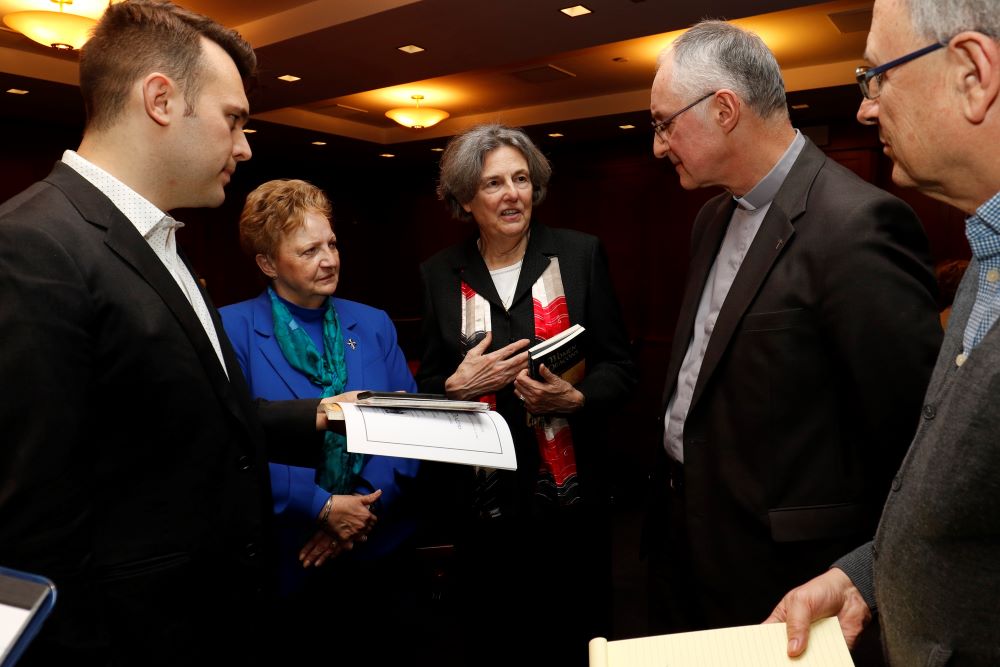
Catholic scholar and author Phyllis Zagano is flanked by Dominican Sister Donna Ciangio and Jesuit Fr Bernard Pottier as she speaks with journalists before a 2019 symposium on the history and future of women deacons in the Catholic Church. The event was hosted by the Fordham Center on Religion and Culture. (CNS/Gregory A. Shemitz)
Stanton of Discerning Deacons said she has observed consensus among conservative and progressive Catholics alike on the need for expanded roles for women. "There can be a lot of fear around the words 'ordination' and 'women,' " she said. "But a synodal church can't be afraid to discern certain things."
Hildalgo said that while some may try to shut down the conversation, "There need to be some places where the church is willing to go out on a limb. Let's give it a real hearing."
The working document for the October meetings, called the Instrumentum laboris, features worksheets with 15 questions for the synodal assembly to consider. One question is: "How can the Church of our time better fulfill its mission through greater recognition and promotion of the baptismal dignity of women?"
Advertisement
In that question's "suggestions for prayer and preparatory reflection," the working document specifically mentions the diaconate, noting that, "Most of the Continental Assemblies and the syntheses of several Episcopal Conferences call for the question of women's inclusion in the diaconate to be considered. Is it possible to envisage this, and in what way?"
Duignan, of Women's Ordination Worldwide, welcomes that conversation, but notes that "the synodal dialogue will be painfully incomplete and dishonest if it does not adequately address the widespread calls to open all ordained ministries to women."
"While the working document does not set out any foregone conclusions, by intentionally ignoring the hundreds of documents submitted to the synodal office calling for women to be ordained as priests, we can see that the synodal process may allow for some progress but in a very controlled and limited way," she said.
McElwee said many longtime members of WOC have a "healthy skepticism" about the possibility of change but theirs is a "long-haul movement."
"The Vatican doesn't have a lot of credibility when it comes to creating spaces for inclusion for women," she said. "And our members are aware that the pace of synodality is quite slow in terms of the urgent injustices in the church. But we hold that tension, believing in the movement of the Holy Spirit and living in hope."
"As long as conversation continues, that's a reason for hope," she said.
Whatever happens, advocates say their members stand ready should change come. "We have communities that are ready to receive women deacons if the doors of the church were to open," said Stanton.
And if change does not come in the immediate aftermath of the October synodal meetings, then "we'll be disappointed," Stanton said, "but we'll be disappointed together and we'll discern how to go forward. Our faith doesn't rise or fall on one outcome or another. But we're realizing that this [synodality] is a better way to do church together. The journey itself has already borne so much fruit."
Lopez agrees the conversation will continue. "Whatever happens in this official process, we are continuing to plant seeds and push back the horizon of what's possible," she said. "We'll continue to walk together in this process. That's the gift of the synod."
*This story was updated after initial publication to offer clarification regarding the roles of permanent and transitional deacons.








